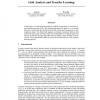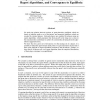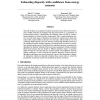NIPS
2007
14 years 4 months ago
2007
The learning of probabilistic models with many hidden variables and nondecomposable dependencies is an important and challenging problem. In contrast to traditional approaches bas...
NIPS
2007
14 years 4 months ago
2007
In this paper we model relational random variables on the edges of a network using Gaussian processes (GPs). We describe appropriate GP priors, i.e., covariance functions, for dir...
NIPS
2007
14 years 4 months ago
2007
We study the relation between notions of game-theoretic equilibria which are based on stability under a set of deviations, and empirical equilibria which are reached by rational p...
NIPS
2007
14 years 4 months ago
2007
When we have several related tasks, solving them simultaneously is shown to be more effective than solving them individually. This approach is called multi-task learning (MTL) and...
NIPS
2007
14 years 4 months ago
2007
Learning the common structure shared by a set of supervised tasks is an important practical and theoretical problem. Knowledge of this structure may lead to better generalization ...
NIPS
2007
14 years 4 months ago
2007
We give a new class of outer bounds on the marginal polytope, and propose a cutting-plane algorithm for efficiently optimizing over these constraints. When combined with a concav...
NIPS
2007
14 years 4 months ago
2007
We study the rates of growth of the regret in online convex optimization. First, we show that a simple extension of the algorithm of Hazan et al eliminates the need for a priori k...
NIPS
2007
14 years 4 months ago
2007
The peak location in a population of phase-tuned neurons has been shown to be a more reliable estimator for disparity than the peak location in a population of position-tuned neur...
NIPS
2007
14 years 4 months ago
2007
Many formal models of cognition implicitly use subjective probability distributions to capture the assumptions of human learners. Most applications of these models determine these...
NIPS
2007
14 years 4 months ago
2007
We present an algorithm called Optimistic Linear Programming (OLP) for learning to optimize average reward in an irreducible but otherwise unknown Markov decision process (MDP). O...



